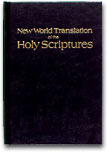Saturday, April 28, 2007
Wednesday, February 07, 2007
Where is this promised presence of his?
I would like to ask a question with regard to the presence of Christ, specifically about 2 Peter 3-10 which reads in part v 3 "For you know this first, that in the last days there will come ridiculers with their ridicule proceeding according to their own desires and saying "where is this promised presence of his? Why from the days our forefathers fell asleep in death all things are continuing exactly as from creation's beginning"
The watchtower applies this prophesy to Christendom but does it not seem that Peter is talking about persons who believed that they had received a promised presence and for whatever reasons have given up waiting for its occurrence or indeed believing in its existence.?
Is this related to the wise and foolish virgins? Even more notably Watchtower loyalists who maintain the authenticity of the 1914 doctrine could even attempt to apply this scripture to ourselves, under the guise of us having given up waiting for the presence/ revelation of Christ due to the time elapsed from 1914.
I feel this question needs to be approached because the answer may provide us with another time marker of events to come.
The question is, are these the last days? According to the letter of James the last days are the actual period of judgment referred to as "the day of slaughter." James 5:3-5 reads: "Your gold and silver are rusted away, and their rust will be as a witness against you and will eat your fleshy parts. Something like fire is what you have stored up in the last days. Look! The wages due the workers who harvested your fields but which are held up by YOU, keep crying out, and the calls for help on the part of the reapers have entered into the ears of Jehovah of armies. You have lived in luxury upon the earth and have gone in for sensual pleasure. You have fattened your hearts on the day of slaughter"
Needless to say "the day of slaughter" has not arrived. Nor has gold and silver, representing the monetary system, dissolved.
Also, Paul referred to the last days as being a "critical times hard to deal with." Do our times fit that description? Jehovah's Witnesses think so. Surely society is characterized by egotistical men and lovers of pleasures and all the other unsavory characteristics Paul said would prevail. However, we should not suppose that men will become such during the last days. The last days will be difficult to deal with, not because people will suddenly become corrupt but because people are already corrupted, so that when the last days begin civilization will come unraveled.
As regards the prophecy finding fulfillment in Jehovah's Witnesses, considering that Jehovah's Witnesses believe that Christ's presence already began back in 1914, that prevailing assumption will undoubtedly prevent a sizable number from recognizing and accepting the sign of Christ's actual presence. For instance, in the event of another outbreak of global war, perhaps involving the use of nuclear weapons, accompanied by pandemics and food shortages, how many of Jehovah's Witnesses would have the spiritual insight to discern that such a development more precisely fulfills the prophecy of Christ's parousia? In that sense the ridiculers could very well be those who have come to believe that Christ's presence has already begun and the any future wars and pandemics are not out of the ordinary, hence the response -- "all things are continuing exactly the same as from creation's beginning."
Tuesday, January 09, 2007
What about the locust of Joel and Revelation?
The locusts of Joel seem strikingly parallel with those of John’s apocalyptic vision. Why does e-watchman on the one hand identify the locusts of Joel as the future 8th king that devastates God’s people, and the locusts of Revelation as the kings of God’s kingdom?
The prophecy of Joel and Revelation both use locusts to symbolize armies of men. However, that’s where the similarity ends.
Here are a few dissimilarities: The prophecy of Joel not only depicts the invading army as a plague of devouring locust, but also they are likened to caterpillars and cockroaches. The devouring insects could not possibly represent God’s people, as the Watchtower insists. The obvious reason being that God’s people are the victims of the insect onslaught. Not only that, but Joel indicates that Jehovah intervenes to save his people from the plundering pest by driving them into the sea. (For a detailed discussion of the prophecy of Joel see the essay: Day of the Locust Attack)
Elsewhere in the Hebrew prophecies locusts are used to symbolize enemy armies. For example, the prophecy of Nahum likens the Assyrian army to locusts: “As for the locust species, it actually strips off its skin; then it flies away. Your guardsmen are like the locust, and your recruiting officers like the locust swarm. They are camping in the stone pens in a cold day. The sun itself has but to shine forth, and away they certainly flee; and their place is really unknown where they are.”
On the other hand the locust-like men symbolized in the 9th chapter of Revelation are under orders to torment the people of the world who do not have the seal of God. This is the exact same work the “two witnesses” in the 11th chapter of Revelation do, which is to say they preach a message of doom that torments the world. In view of the fact that the locusts are wearing crowns it is evident that they are the sons of kingdom, who at that point will have been given the kingdom and so will have full authority to execute Jehovah’s judgments upon the earth.
Subscribe to:
Posts (Atom)


